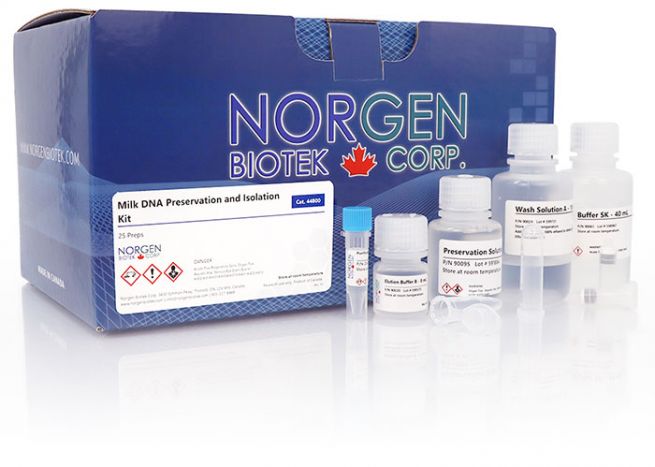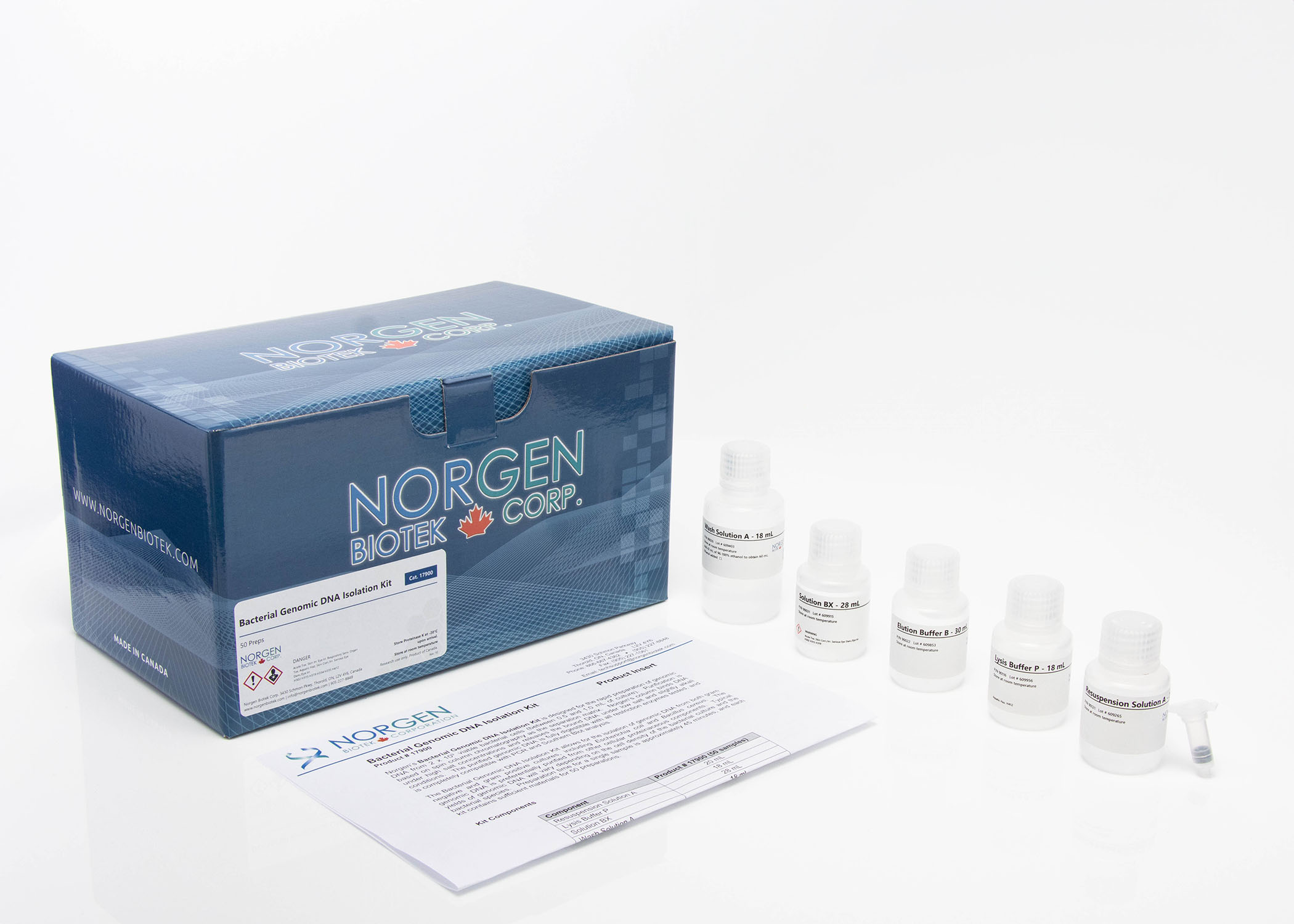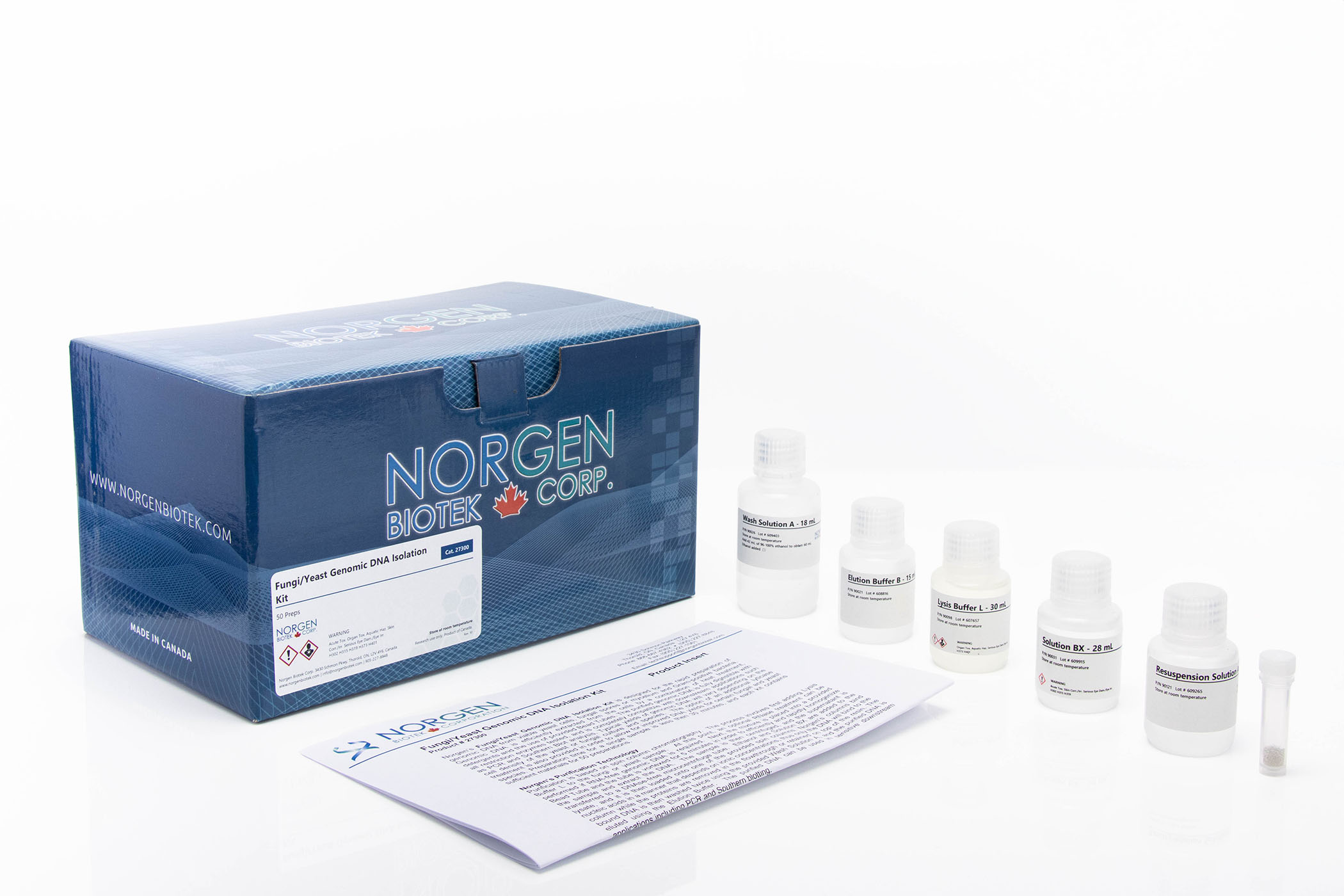Milk Bacterial DNA Isolation Kit
For the rapid purification of genomic DNA from various bacterial species found in milk

For research use only and NOT intended for in vitro diagnostics.
Milk Bacterial DNA Isolation Kit
For the rapid purification of genomic DNA from various bacterial species found in milk
Register today to receive an exclusive 15% off* on your first order.
Features and Benefits
- Genomic DNA can be isolated from as few as 10 bacterial cells in 1 mL of milk
- Isolate genomic DNA from both Gram-negative and Gram-positive bacteria in milk
- Can process challenging samples such as mastitic milk
- Inhibitor-free DNA is ready for PCR, qPCR, Southern Blot, sequencing & more
- Fast and efficient spin-column format
This kit provides a rapid spin column method for the isolation and purification of genomic DNA from both Gram-negative and Gram-positive bacteria in milk samples. It can also be used to process challenging milk samples such as Mastitic milk for example. The kit is highly sensitive and can isolate DNA from a cell density of as little as 10 bacteria contained in 1 mL of milk. Genomic DNA is isolated in 45 minutes, free of inhibitors and ready for any number of downstream applications including PCR, qPCR and Southern Blot analysis, sequencing and more.
Details
Supporting Data
Figure 1. Isolation and Detection of DNA from as Little as 10 Bacterial Cells in 1 mL of Milk. Increasing amounts of E coli (101 cells, 103 cells, 105 cells, 107 cells) were added to 1 mL pasteurized milk samples, and the bacterial DNA was subsequently isolated using Norgen's Milk Bacterial DNA Isolation Kit with a 200 µL elution volume. One microliter of the isolated genomic DNA was then detected in a 20 µL real-time PCR reaction using primers specific to E coli. Bacterial genomic DNA could be isolated and detected from all the 1 mL milk samples, including the sample that contained only 10 bacterial cells (blue line).
Figure 2. End-Point PCR of Milk Bacterial DNA samples. One milliliter of milk was spiked with various amount of E coli. Bacterial DNA was isolated in duplicate using Norgen's Milk Bacterial DNA Isolation Kit, and 1 µL of each 200 µL elution was used for conventional PCR. For analysis 10 µL of each PCR was loaded on an agarose gel. The amount of bacteria in each milk sample is as follows: A = 107 cells, B = 105 cells, C = 103 cells, D = 101 cells. Lane X is a negative control (no template) and Lane M is Norgen's PCRSizer 100bp DNA Ladder.
Figure 3. Hierarchial Clustering Dendrogram of Milk Related Microorganisms Found in Milk Samples. DNA was isolated using Norgen’s Milk Bacterial DNA Isolation Kit and the 16S Metagenomic Sequencing Library was prepared according to the Illumina MiSeq System. This dendogram shows a hierarchial clustering of samples based on genus-level classifications. The barchart beneath each sample shows the relative abundance of its genus-level classifications.
|
Kit Specifications
|
|
| Maximum Milk Input | 1 mL |
| Time to Complete 10 Purifications | 1 hour |
| DNA Yield* | 500 ng to 8 μg |
| Bacteria Species Processed | Gram positive and Gram negative |
| Minimum Detection Limit | 10 bacteria in 1 mL of milk |
*The range of the DNA yield will vary depending upon a number of factors including bacterial species and type of milk (fat content and %)
Storage Conditions and Product Stability
All solutions should be kept tightly sealed and stored at room temperature. The Lysozyme should be stored at -20°C upon arrival, and the Resuspension Solution A should be stored at -20°C after addition of the lysozyme. The lyophilized Proteinase K should be stored at -20°C upon arrival and after reconstitution. This kit is stable for 1 year from the date of shipment.
| Component | Cat. 21550 (50 preps) |
|---|---|
| Resuspension Solution A | 6 mL |
| Buffer SK | 60 mL |
| Wash Solution A | 18 mL |
| Elution Buffer B | 15 mL |
| Proteinase K | 12 mg |
| Lysozyme (powder) | 120 mg |
| Spin Columns | 50 |
| Collection Tubes | 50 |
| Elution Tubes (1.7 mL) | 50 |
| Product Insert | 1 |
Documentation
FAQs
Spin Column
Clogged columns may occur due to:
- The sample is too large.
Ensure that no more than 1 mL of subclinical mastitis milk or no more than 200 µL of clinical mastitis milk is used for the procedure in order to prevent clogging of the column. Clogging can be alleviated by increasing the g-force and/or centrifuging for a longer period of time until the lysate passes through the column.
- The milk sample is very viscous.
If the sample is very viscous and difficult to pipette, pass the sample through an 18-gauge syringe a few times to reduce the viscosity prior to the first 3 minute spin.
- White, creamy layer was not removed after initial spin.
After the first 3 minute spin, ensure that the white, creamy layer floating on top of the milk sample is removed. This layer should be removed in order to prevent clogging of the column.
Experiencing gelatinous lysate prior to loading onto the column may be due to the following factors:
- White, creamy layer was not removed after initial spin.
After the first 3 minute spin, ensure that the white, creamy layer floating on top of the milk sample is removed. This layer should be removed in order to minimize the thickness of the lysate.
- The sample is too large.
Too many cells are in the lysate preparation. Ensure that no more than 1 mL of milk is used for the procedure. If the milk sample is known to have a high bacterial content or categorized as clinical mastitis, it is recommended no more than 200 µL is used for the input.
The yield of genomic DNA may be lower than expected due to the following:
- The milk sample may not contain any bacterial species.
If the milk sample does not contain any bacteria, then no genomic DNA will be detected.
- Incomplete lysis of cells.
Extend the incubation time of Proteinase K digestion or reduce the amount of milk used for the input. Increase the lysozyme incubation time for Gram-positive strains.
- The DNA elution is incomplete.
Ensure that centrifugation at 14,000 x RPM is performed after the 2,000 x RPM centrifugation cycle, to ensure that all the DNA is eluted.
Sheared genomic DNA may occur due to:
- Improper handling of genomic DNA.
Pipetting steps should be handled as gently as possible. Reduce vortexing times during mixing steps (no more than 10-15 seconds).
Citations
| Title | Pulsed-field gel electrophoresis typing and molecular characterization of Listeria monocytogenes isolates in raw milk samples from Polonnaruwa District, Sri Lanka |
| Citation | Journal of the National Science Foundation of Sri Lanka 2023. |
| Authors | WAS Wijendra*, AGG Kaushalya, KGR Kuruppuarachchi, HBC Harshani, WASI Fonseka and R Ramesh |
| Title | Raw milk kefir: microbiota, bioactive peptides, and immune modulation |
| Citation | bioRxiv|Food & Function 2023. |
| Authors | Ton Baars, Betty van Esch, Luuk van Ooijen, Zuomin Zhang, Pieter Dekker, Sjef Boeren, Mara Diks, Johan Garssen, Kasper Hettinga and Remco Kort |
| Title | Visualizing the Indefinable: Three-Dimensional Complexity of 'Infectious Diseases' |
| Citation | PLoS One 2023. |
| Authors | G Leitner, SE Blum, AL Rivas |



